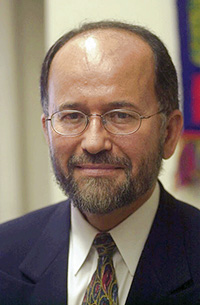Evening at Egan: Security and Governance in ‘post-Taliban’ Afghanistan: What went wrong and why?
Academic analyst and commentator Dr. Nazif Sharhrani will share his insights on US foreign policy in Afghanistan.
Juneau, Alaska
Date of Press Release: October 26, 2009

The University of Alaska Southeast and Juneau People for Peace and Justice are happy to welcome Dr. Nazif Shahrani for the next Evening at Egan lecture. Dr. Shahrani, highly respected in his field, is a main academic analyst and commentator on the current situation in Afghanistan. He will share his insights on U.S. foreign policy in Afghanistan at the Egan Library on the University of Alaska Southeast Auke Lake campus on Friday, October 30 at 7 p.m.
“Two facts have shaped my career as a "native" anthropologist,” said Dr. Shahrani. “My personal conviction, formed in the mid-1960's as a college student in Afghanistan, that anthropology was a discipline relevant to the future development of countries such as my own homeland. Sociocultural anthropology in particular, I believed, offered analysis of, and remedies for, contemporary social problems -- grinding poverty, injustice, inequality, socioeconomic and technological under-development.”
Nazif Shahrani was born in Badakhshan province of Afghanistan. He completed his elementary education in the village of Shahran-i-Khaash, in Jurm district of Badakhshan, attended Ibnisina (Avecina) Middle School and Kabul Darul Mu'alimin (Kabul Teachers Training High School) in Kabul before entering the Faculty of Education at Kabul University, Afghanistan.
During his junior year at Kabul University, in 1967, he was awarded an East-West Center scholarship by the University of Hawaii, Honolulu where he completed his BA in Anthropology (1970). He received an MA and Ph.D. from the University of Washington, Seattle (1970-1976). Between 1972 and 1974, Shahrani conducted anthropological field research in the Wakhan region in northeastern Afghanistan among pastoral nomadic Kirghiz[Kyrgyz] in the Pamirs and their neighbors the Wakhi agropastoralist community. He later worked as an anthropological consultant for the ethnographic film, The Kirghiz of Afghanistan, which was aired on PBS’s Odyssey series (fall 1981). Shahrani has had research and teaching positions at several American Universities, including Harvard’s Center for Middle Eastern Studies, the University of Nevada-Reno, Stanford University, and UCLA, before moving to Indiana University in 1990. He was also a Fellow at the Woodrow Wilson Center for International Scholars of the Smithsonian Institution (1997-98). He teaches in the Anthropology, Central Eurasian Studies, and Near Eastern Languages and Cultures departments at Indiana University. He has conducted extensive field research in Afghanistan, Turkey, Pakistan and Uzbekistan.[1]
He is the author of The Kirghiz and Wakhi of Afghanistan: Adaptation to Closed Frontiers and War. Seattle. University of Washington Press, 2002.